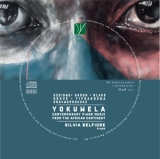So minimalistisch das Stück Ukom des nigerianischen Komponisten Joshua Uzoigwe (1964-2005) auch klingt, so sehr es von europäischer Musiktechnik beeinflusst sein mag, mit seinen Ursprüngen im Trommelspiel versteckt Ukom seinen genuin afrikanischen Charakter nicht.
Das gilt für einige, wenn auch nicht für alle Werke dieser hoch interessanten CD, die letztlich ein Ergebnis des interkulturellen Austauschs zwischen westlicher klassischer Musik und traditionellen afrikanischen Musikkulturen ist.
Der 1965 geborene Nigerianer Godwin Sadoh etwa, oder der Äthiopier Girma Yifrashewa (*1956) präsentieren melodischere Musik, in der, wie im dritten der Moonlight Dances z.B., auch westliche Einflüsse wie der Ragtime zur Geltung kommen.
Einfallsreicher, persönlicher ist Stefans Grovés Komposition Nonyana, the Ceremonial Dancer, die indigene, rituelle afrikanische Musik so verarbeitet wie es Bartok in seinem Kulturbereich tat
Den umgekehrten Weg geht der Südafrikaner Michael Blake (1951) in seiner French Suite, die als eine Folge von mehreren « unaufdringliche Übersetzungen afrikanischer Musik in westliche Idiomen » beschrieben wurde.
Stefan Grovés Haunting Music (Musik aus Afrika Nr. 39) ist trotz des Untertitels klanglich sehr westlich angelegt und baut auf mysteriösen Stimmungen auf, die laut den Satztiteln aus einem ‘seltsamen Nebeltal » oder einem ‘Zauberwald’ kommen, derweil sich im letzten Satz, Hobgoblin at Midnight, auch koboldartige Rhythmik manifestiert.
Beschlossen wird das Programm mit dem 20. Stück, Miners Chorus, aus den Twenty-Four Studies in African Rhythms des ghanaisch-amerikanischen Komponisten Fred Onovwerosuoke (*1960). Jede Etüde ist von einem Lied oder einem Tanz aus einem anderen afrikanischen Land geprägt. Miner’s Chorus ist mit einem erstaunlich jazzigen Walzerrhythmus unterlegt, der spannende Veränderungen erfährt.
Wer also mal wirklich aus traditionellen Hörgebieten ausbrechen will, wird sich an dieser CD mit afrikanischer Klaviermusik erfreuen könne. Das Programm wird von Silvia Belfiore mit gutem Gespür für Rhythmik wie auch für das Melodische gespielt.
As minimalist as the piece Ukom by Nigerian composer Joshua Uzoigwe (1964-2005) sounds, as much as it may be influenced by European musical technique, with its origins in drumming, Ukom does not hide its genuinely African character.
This is true for some, though not all of the works on this highly interesting CD, which is ultimately a result of the intercultural exchange between Western classical music and traditional African music.
The Nigerian Godwin Sadoh, born in 1965, or the Ethiopian Girma Yifrashewa (*1956) present more melodic music in which, as in the third of the Moonlight Dances, for example, Western influences such as ragtime also come to the fore.
More imaginative, more personal is Stefans Grovés composition Nonyana, the Ceremonial Dancer, which processes indigenous, ritual African music as Bartok did in his cultural region.
South African Michael Blake (1951) takes the opposite approach in his French Suite, which has been described as a sequence of several « unobtrusive translations of African music in Western idioms. »
Stefan Grové’s Haunting Music (Music from Africa No. 39), despite its subtitle, is tonally very Western, building on mysterious moods that, according to the movement titles, come from a ‘strange valley of mist’ or an ‘enchanted forest’, while goblin-like rhythms characterize the last movement, Hobgoblin at Midnight.
The program concludes with the 20th piece, Miners Chorus, from the Twenty-Four Studies in African Rhythms by Ghanaian-American composer Fred Onovwerosuoke (b. 1960). Each etude is influenced by a song or dance from a different African country. Miner’s chorus is characterized by a surprisingly jazzy waltz rhythm that undergoes exciting changes.
So if you really want to break out of traditional listening territory, you’ll enjoy this CD of African piano music. The program is played by Silvia Belfiore with a good sense of rhythm as well as melody.
























